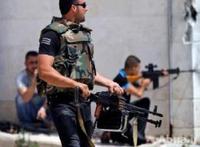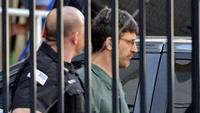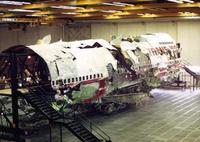-
U.S. ports vulnerable to cyberattacks
New study says that the U.S. largest ports are vulnerable to cyberattacks.The study argues that the level of cyber security awareness and culture in U.S. port facilities is relatively low, and that a cyberattack at a major U.S. port would quickly cause significant damage to the economy.
-
-
Arab world welcomes Brotherhood’s fall
Leaders throughout the Arab world could barely contain their glee at the news that the short and acrimonious era of Muslim Brotherhood rule in Egypt is over, and is not likely to return. The fractious Arab world has rarely shown such unanimity. Familiarity breeds contempt, though, and the antipathy toward the Brotherhood and its brand of politics has always been something most Arabs – secular and religious – could agree on, and on Thursday the region was awash with schadenfreude.
-
-
Protecting drinking water systems from deliberate contamination

The importance of water and of water infrastructures to human health and to the running of the economy makes water systems likely targets for terrorism and CBRN (chemical, biological, and radionuclide) contamination. Reducing the vulnerability of drinking water systems to deliberate attacks is one of the major security challenges. An international project has developed a response program for rapidly restoring the use of drinking water networks following a deliberate contamination event.
-
-
Egypt’s military ousts Morsi from the presidency, suspends constitution
Acting on its ultimatum, the Egyptian military has ousted Mohammed Morsi from the presidency of Egypt and announced that the constitution, ratified last December, has been suspended. Parliament, too, has been disbanded. Government ministers were ordered to clean their desks and vacate their offices. The chief of the constitutional court will assume the role of president on an interim basis.
-
-
Isolated, defiant Morsi rallies his supporters for battle as army’s ultimatum looms
Facing an ultimatum issued Monday by Egypt’s powerful army, President Mohamed Morsi, in a midnight speech, defiantly announced that he would not resign under pressure and, if necessary, protect his presidency with his life. Analysts note that the speech was aimed to rally his Islamic supporters and prepare them for likely violence ahead, rather than placate the protesters or signal his willingness to reconcile with the demands of the military. The military gave Morsi until 17:00 Egypt’s time (10:00 a.m. EST) to meet the protesters’ demands – chief among them Morsi’s own resignation. In response to Morsi’s speech, the Egyptian military announced: “We swear to God that we will sacrifice even our blood for Egypt and its people, to defend them against any terrorist, radical or fool.”
-
-
Egyptian military hits the reset button on Egypt’s Arab Spring
There are still twenty-four hours left in yesterday’s 48-hour ultimatum the Egyptian military gave President Mohammed Morsi to meet the protesters’ demands. The military said that if Morsi did not meet the protesters’ demands, then it — the military — will unveil its own “roadmap for the future” of Egypt. Sources in the Egyptian military are not waiting until Wednesday to outline the plan – or roadmap — the military will announce tomorrow. The roadmap will consist of five steps: removing Morsi and his government, appointing an interim government of technocrats, disbanding parliament, rewriting of the constitution, and calling for new elections.
-
-
Egypt’s military gives Morsi 48 hours to meet demonstrators’ demands – or else (updated)
On Monday, following days of anti-government demonstrations, which culminated Sunday with millions of Egyptians filling the streets of Egypt’s major cities, the Egyptian military issued an ultimatum to President Mohammed Morsi: the military gave the president forty-eight hours to respond to the demands of the protesters – chief among them that he resigned from the position of president. If Morsi failed to meet the demands of the protesters, the military said it would offer its own “roadmap for the future” of Egypt. Ten government ministers announced their resignation from the cabinet in sympathy with the protesters. The interior Ministry announced its “complete solidarity” with the military. Morsi’s aides indicated he would not give in to the threat of a military coup.
-
-
Egypt’s military gives Morsi 48 hours to meet demonstrators’ demands – or else
Two-and-a-half years ago, as a wave of popular demonstrations against the government of President Hosni Mubarak engulfed Egypt, the Egyptian military told Mubarak that it was not going to shoot at the protesters and suppress the demonstrations, and that the only way out of the crisis would be for Mubarak to resign. Earlier today (Monday), following days of anti-government demonstrations, which culminated Sunday with millions of Egyptians filling the streets of Egypt’s major cities, the Egyptian military issued a similar ultimatum to President Mohammed Morsi: the military gave the president forty-eight hours to respond to the demands of the protesters – chief among them that he resigned from the position of president. If Morsi failed to meet the demands of the protesters, the military said it would offer its own “roadmap for the future” of Egypt.
-
-
U.K. increases intelligence agencies’ budget to counter terror threat
George Osborne, Chancellor of the Exchequer, will today announce the government’s spending plans for FY 2015-16. The U.K. agencies responsible for fighting terrorism — MI6, MI5, and Government Communications Headquarters (GCHQ) — will see a significant increase in their combined £1.9 billion budget, an indication of the David Cameron government’s concern about the growing terrorism threat the United Kingdom.
-
-
U.S. has been secretly training Syrian rebels for months

Since late last year, CIA operatives and U.S. Special Forces have been secretly training Syrian rebels to used anti-tank and anti-aircraft weapons. the training is being conducted at U.S. bases in Jordan and Turkey, and involves fighters from the Free Syrian Army, a loose confederation of mostly secular rebel groups – many of who deserters from the Syrian military — fighting to take down Syrian President Bashar al-Assad.
-
-
Nevada Sheriff wants DHS to do more before, rather than after, attacks
Clark County, Nevada, Sheriff Doug Gillespie says DHS needs to make a bigger effort to help local law enforcement work on preventing terrorist attacks, instead of responding to them after the fact. Gillespie used the Boston Marathon bombings as an example of the importance of prevention efforts, noting that the response to the attacks was handled well, but that people were already killed and injured.
-
-
DHS wants to upgrade BioWatch, but admits the system addresses a receding threat
The BioWatch program has cost more than $1 billion so far, and DHS wants billions more for upgrading it. The system is designed to detect large-scale bioterror attacks, but DHS, in its revised assessment of bioterror threats to the United States, said that rather than a massive release of germs in an American city – the kind of attack BioWatch sensors were aimed to detect – the more likely bioterror attacks are small-scale releases of anthrax or other pathogens. Such small-scale attack would likely not be picked up by BioWatch. Lawmakers want to know whether investing billions more in the system is worthwhile.
-
-
Two men charged with planning an “X-ray weapon’’ to kill Muslim enemies of U.S., Israel

Two men from upstate New York were charged Wednesday with a scheme to build an X-ray weapon to kill Muslim enemies of the United States and Israel. They planned the weapon to kill the designated targets with lethal radiation, and some of the targets were to be killed in their sleep. The indictment says the two wanted to build a powerful X-ray device that could be placed in a truck and driven near a target. The driver would park, leave the area, and activate the device, “killing human targets silently and from a distance with lethal doses of radiation.”
-
-
Former investigators pushing for new look into TWA flight 800 crash

Former investigators want to reopen the case of the 1996 TWA Flight 800 crash off the coast of Long Island. They say that new evidence points to a missile strike that may have hit the jet. Theories of an errant missile being fired from a U.S. military vessel – advanced, among others, by Pierre Salinger, who was JFK’s press secretary in the early 1960s — were refuted, but a separate theory of shoulder-fired missile fired by terrorists has lingered.
-
-
NSA chief: surveillance programs helped prevent terror plots more than 50 times since 9/11

The National Security Agency (NSA) and Justice Department on Tuesday offered a trenchant defense of the NSA’s surveillance programs. Gen. Keith Alexander, NSA director and commander of the U.S. Cyber Command, told lawmakers that the programs have helped prevent “potential terrorist events” more than fifty times since 9/11. Officials also offered a point-by-point rebuttal of the criticism of the program by civil libertarians, emphasizing that authorities, when they gather phone records, cannot immediately find out the identity or location of the callers.
-
More headlines
The long view
How Male Grievance Fuels Radicalization and Extremist Violence
Social extremism is evolving in reach and form. While traditional racial supremacy ideologies remain, contemporary movements are now often fueled by something more personal and emotionally resonant: male grievance.
